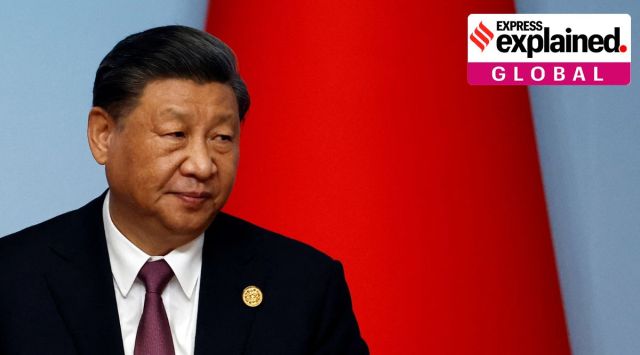The word “de-risking” was again used in the statement to describe the G7 countries’ stance towards China on economic matters.

And during a press conference at the end of the summit, United States President Joe Biden said: “We’re not looking to decouple from China. We’re looking to de-risk and diversify our relationship with China.”
Biden said that the incident with “this silly balloon that was carrying two freight cars worth of spying equipment” had changed “everything…in terms of talking to one another”, but he expected a “thaw very shortly”.
He was referring to the incident in February 2023 in which the US Air Force, acting on Biden’s orders, shot down a Chinese-operated white high-altitude balloon over US territorial waters off the coast of South Carolina. China, while agreeing that it was their balloon, denied accusations of spying, said it was only a weather balloon, and criticised the American action.
What does “de-risking” mean?
The US State Department describes de-risking as “the phenomenon of financial institutions terminating or restricting business relationships with clients or categories of clients to avoid, rather than manage, risk”. Simply put, de-risking is to move business away from areas that are considered risky in terms of the returns they could generate.
Back in 2016, the World Bank had said that global financial institutions were increasingly terminating or restricting business relationships with smaller local banks in some regions in order to “de-risk”, as it is often perceived that such banks would not be able to pay back loans.
Story continues below this ad
In the context of China, de-risking can be interpreted as a reduction of the reliance on China in the economic sphere — for the supply of materials or as a market for finished goods — so that potential risks to trade and disruption of supply chains are reduced.
In the G7 statement, the countries said, “Our policy approaches are not designed to harm China nor do we seek to thwart China’s economic progress and development. A growing China that plays by international rules would be of global interest.”
The statement clarified, “We are not decoupling or turning inwards. At the same time, we recognize that economic resilience requires de-risking and diversifying. We will take steps, individually and collectively, to invest in our own economic vibrancy. We will reduce excessive dependencies in our critical supply chains.”
‘Decoupling’ is used here as an alternative to an economic boycott. In 2018, the Trump administration raised tariffs on China’s aluminium and steel exports to improve the balance of trade with China, which resulted in a trade war after China retaliated by imposing tariffs worth hundreds of billions of dollars on US products.
Story continues below this ad
Have ‘de-risking’ and ‘decoupling’ been used earlier in the context of diplomatic strategy?
Yes, several times in the recent past — even though commentators have pointed out that this current buzzword remains undefined, and it is unclear what policies exactly will constitute de-risking.
On April 27, US National Security Adviser Jake Sullivan said : “We are for de-risking, not for decoupling. De-risking fundamentally means having resilient, effective supply chains and ensuring we cannot be subjected to the coercion of any other country.”
Earlier on March 30, European Commission President Ursula von der Leyen had said in Brussels that EU-China relations are “not black or white — and our response cannot be either. This is why we need to focus on de-risking — not decoupling”.
She repeated the same message directly to the Chinese leadership on a trip to Beijing with President Emmanuel Macron of France a week later, European media reported.
Story continues below this ad
And after the first meeting of the India-EU Trade and Technology Council (TTC) on May 16, India’s External Affairs Minister S Jaishankar spoke of de-risking the economy “in an era of global volatility and uncertainty”, but did not mention China.
Has China said anything about this?
The lack of clarity about the term has meant it can be interpreted differently by different parties.
A day after Sullivan spoke, an opinion article published in China’s state-run Global Times said, “So far, we haven’t seen enough sincerity from Washington toward Beijing in its efforts to ‘de-risk but not decouple’. In sectors like manufacturing and information and communications technology, we can still feel the high pressure and even suppression from the US.”
Indeed, the US is working to become self-sufficient in the production of semiconductors, crucial for manufacturing electro.








































